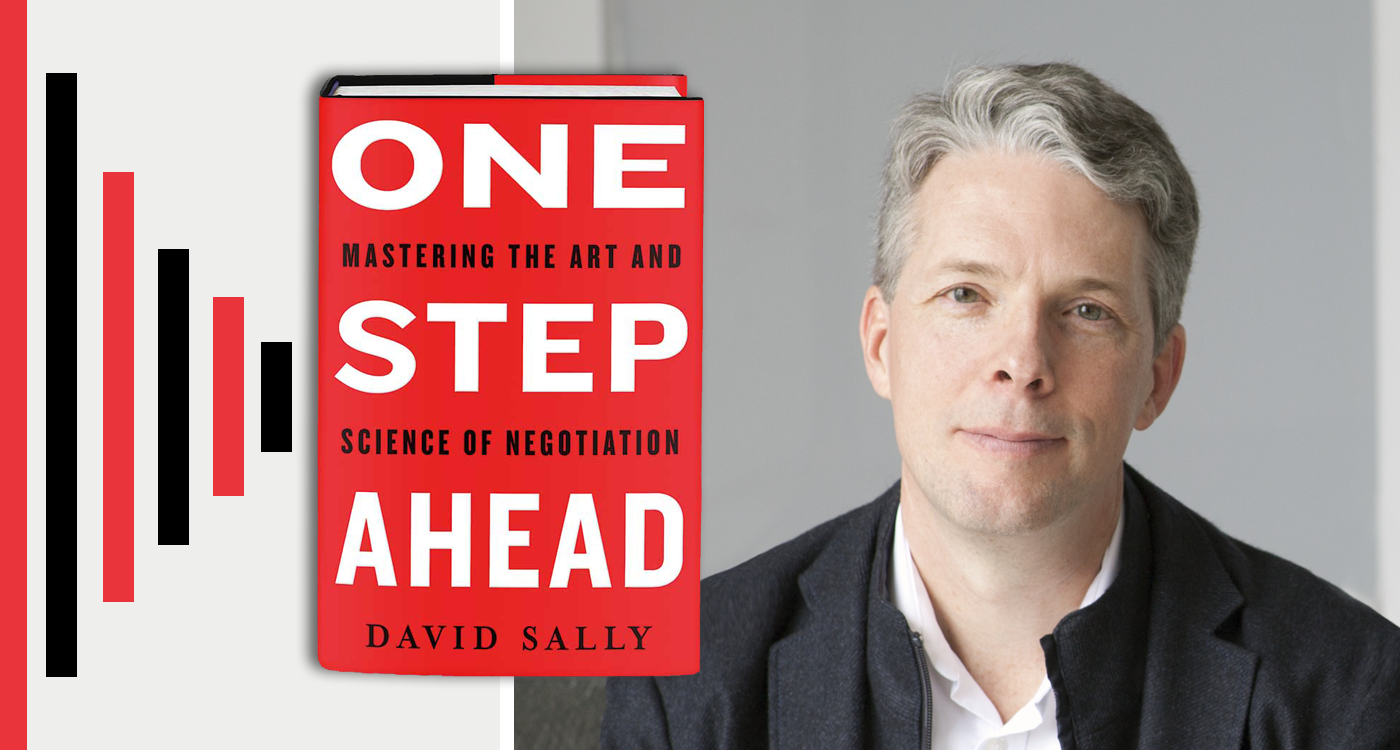Becoming a Sophisticated Negotiator
David Sally, visiting associate professor, on negotiation tactics and his latest book “One Step Ahead: Mastering the Art and Science of Negotiation.”

Toughness, versus fairness, is the key to a successful negotiation, says Sally.
Through behavioral economics and psychology, extensive studies, and concrete observations and results, David Sally, visiting associate professor of business administration and longtime professor of the Negotiations course at Tuck, presents his deep-dive into advanced negotiation in One Step Ahead: Mastering the Art and Science of Negotiation. His latest book presents a new lens redefining what it means to negotiate successfully. It’s incumbent on the reader to understand “negotiations as dramaturgy,” says Sally, and to apply a deeper understanding of numbers and words. We sat down with Sally to discuss what really happens in a negotiation, and how to use your body, words, and even emotions to succeed.
How did your time at Tuck influence your relationship with negotiations?
When I came to Tuck in 2003, I taught two of the negotiation courses, while Judith White, a fellow professor at the time, taught the other sessions. I had a PhD in economics from the University of Chicago, and we came from very different teaching traditions. Judith introduced me to new techniques that guided my teachings. In her classes, after students negotiated a deal, they’d give each other feedback, grading their counterparts on fairness, toughness, and other personal characteristics, all before finding out what the results of the deal were. I adopted this system in my classes, and this feedback would become a valuable source of data. I started looking at broad correlations between an individual’s overall class performance versus personal characteristics as they were perceived by their counterparts, which is outlined in the sixth chapter.
What was the big takeaway in examining these correlations between personal characteristics and a successful negotiation?
What I learned was that modern-day students and modern-day business people underestimate how important it is to be perceived as tough. There’s a complete underweighting of the importance of toughness in a negotiation. Toughness is the single strongest correlation to performance in the data I’ve collected, which comprises one thousand MBA students and top executives.
Students identified that it was positive to be seen as creative, prepared, and communicative. They also believed that the more you are seen as fair, the more successful you will be in a negotiation. The data says this is overly miscalibrated. My research finds there is zero correlation between how you perform and how fair you are perceived to be.
What role does fairness play?
The most advanced effective negotiator is very tough and very fair. I found that there were always a handful of students who were in the top quintile of toughness and fairness. By being seen as tough, they received profitable deals, and by being fair, they preserved relationships—people wanted to deal with them again.
“People misunderstand what true toughness is. It’s not the caricature of the angry, mean, nasty person. … True toughness is about having goals and persistence.”
How important is empathy in a negotiation?
The role of empathy is two-fold, and it fits with both toughness and fairness. Niccolò Machiavelli [Italian Renaissance diplomat, writer, and philosopher] says that the most effective negotiator combines the skills of a psychologist with the task of a prophet. Empathy can be fully embodying yourself in the mind of another person. You’re anticipating and getting in front of your counterpart, and this is where ‘one step ahead’ comes from. The foundation of the book is providing insight into how to identify what level your counterpart is on, and how to get one step ahead of them.
How does one practice effective toughness?
People misunderstand what true toughness is. It’s not the caricature of the angry, mean, nasty person. To behave this way burns up relationship capital. You have to understand what it means to be tough. I give readers a blueprint on being tough, and I use sociological theory to explain it as theater. The book is about the best negotiator’s secrets—what are they actually doing to pull this off?
True toughness is about having goals and persistence. The sophisticated negotiator is a Chinese coin—square on the inside and round on the outside. Squareness is determination, purpose, goal-setting, and being willing to say no. The outside is the circle, you’re fluid and accommodating. The outside is a yes, the inside is a no. This analogy is the true nature of being tough and fair, and the good news is it’s available to anybody in any walk of life.
Beyond toughness, how else does someone get one step ahead in a negotiation?
What I’ve found is that people often don’t prepare enough. One of the characters I portray in the book to demonstrate preparation is a former UN Diplomat, Giandomenico Picco, who single-handedly led the release of eleven western hostages from Beirut in 1991. He would prepare three months for a three-hour meeting. This example reflects how I structure my MBA classes: students begin by learning how to plan—establishing goals, structuring offers, scripting lines, and so forth—and later they stretch to use their empathy, strategic insight, and growing knowledge of the negotiation game to understand their counterpart's intentions and anticipate the other's tactics.
How do you know when to negotiate?
Other famous negotiation literature explains you should always negotiate; you should negotiate everything. But negotiation is tough, it’s costly mentally, and it costs you time. In the book, I explain how to realize when you should and shouldn’t negotiate and to negotiate everything shouldn’t be your knee-jerk reaction—you need to be more strategic.

